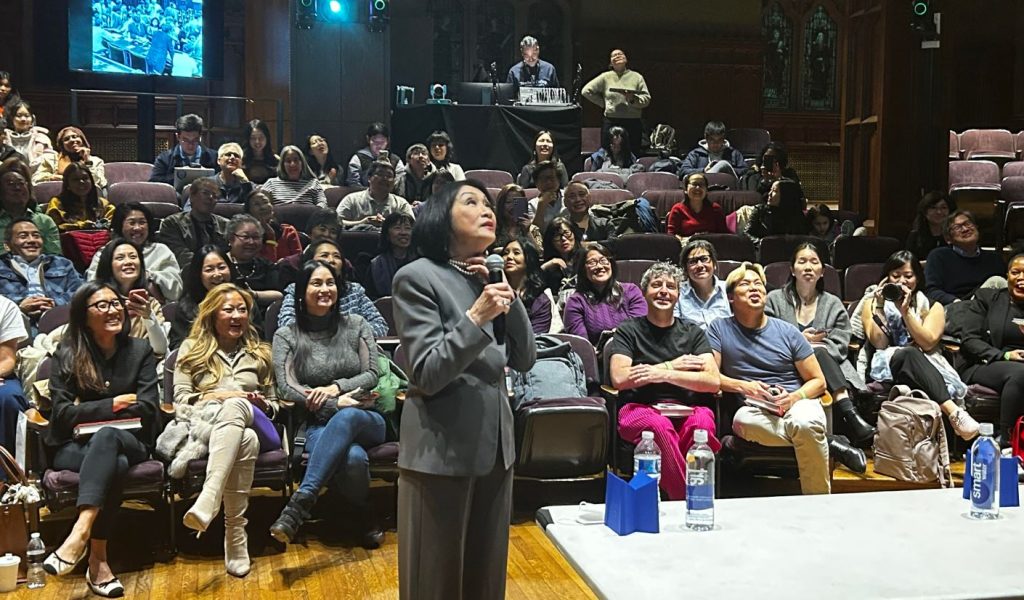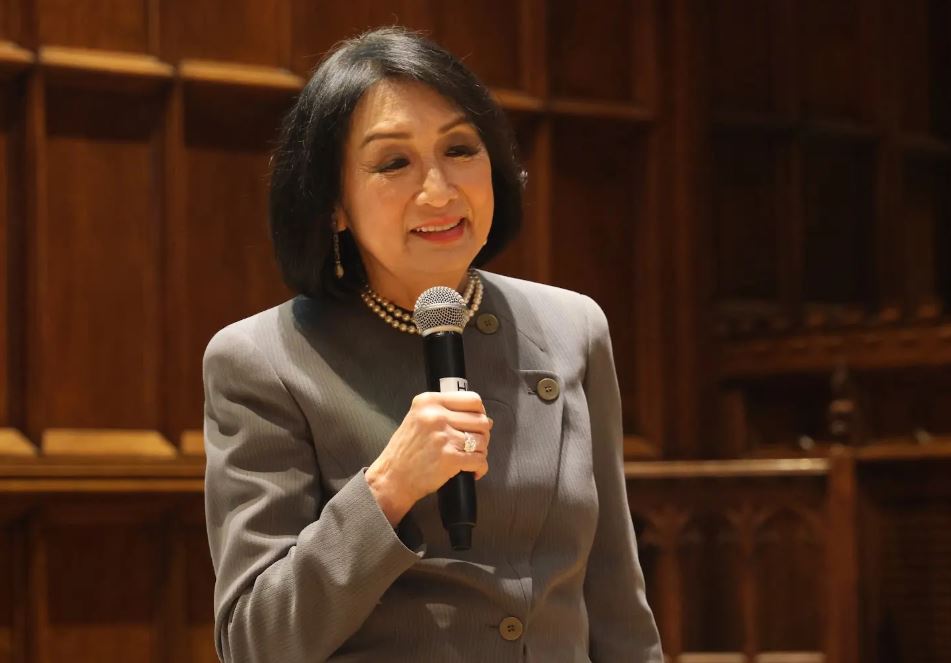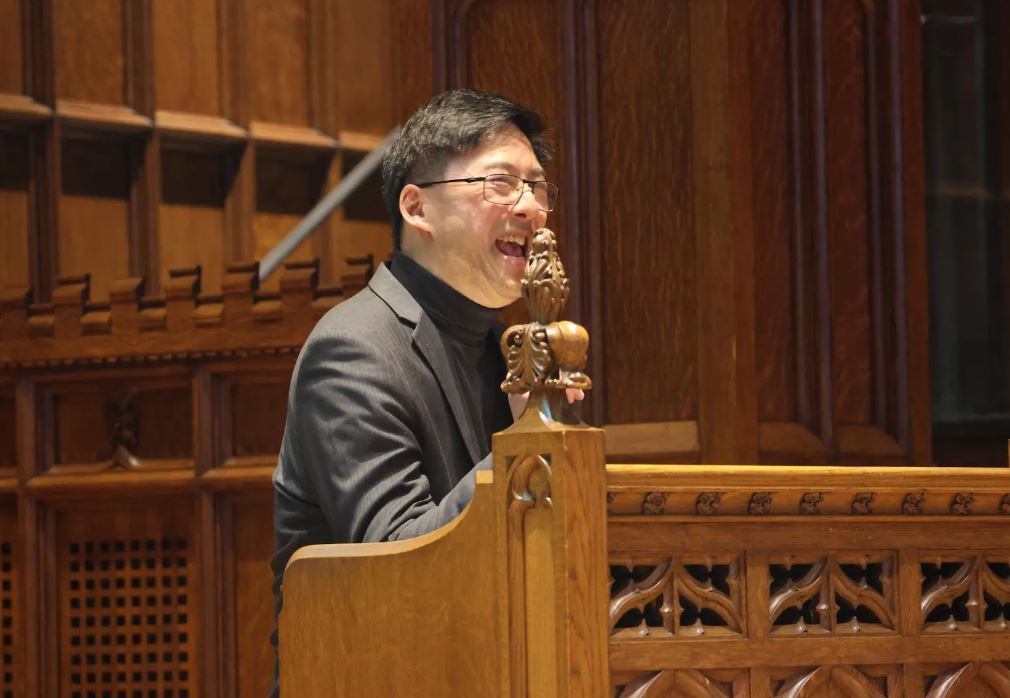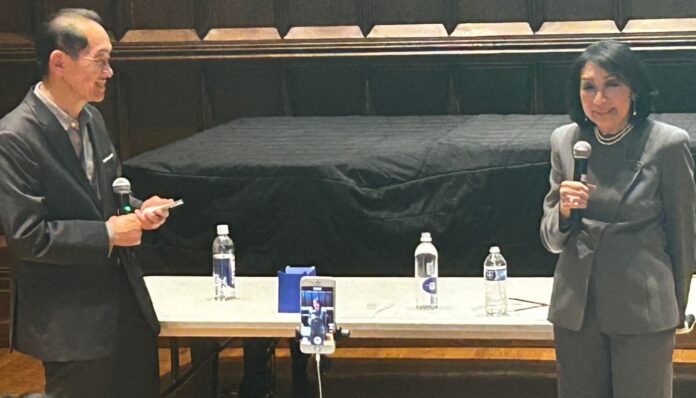By Jessica Xiao
(This story is made possible with the support of AARP)
New York City, New York – AsAmNews recently hosted glass ceiling-breaker Connie Chung, who was the first Asian American and second woman to anchor a major network broadcast, in conversation with veteran New York journalist and AsAmNews contributor Ti-Hua Chang. The event took place at Milbank Chapel on the Columbia University’s campus.
Now 78 years old (“So freaking old, it’s freaking scary,” she remarked at the talk), her new book Connie: A Memoir, details the challenges of being one of the few women in the male dominated field of broadcast journalism. It was published in September and she has been on a book tour to promote the book. Her memoir made it onto Time Magazine’s “100 Must-Read Books of 2024.”
To excel in her field, she writes that she learned to become a White man, so much so that she didn’t always recognize the face of the Chinese American woman she saw in her reflection. Even when she got her dream role of co-anchoring at CBS alongside Dan Rather, she says she faced sexism in the stories she was assigned and in Rather’s opinion of her.
“He said, ‘You’re going to have to start reading the newspaper.’ I thought to myself, dude, do you think I’ve been reading the comics for the past 20 years? I could tell it wasn’t going to be a happy pairing. It reminded me of a movie Bette Davis was in, All About Eve, and she said, ‘Fasten your seat belts, it’s going to be a rocky ride’ — and I knew it was going to be a rocky ride.”

From these experiences of being underestimated or pigeon-holed in her career, she shared advice for women in male-dominated fields, saying that while some things have changed, not much has, and ultimately it is up to women to believe in themselves.
She expressed disappointment the nation chose not to elect the first woman president in this country. She called some of President-elect Donald Trump’s appointments predators. However, she says the recent events shouldn’t slow anyone down.
”We can’t stop fighting, we just can’t. Just because the highest office of the land did not go to us this time we have to believe that it will. We can achieve whatever we want to achieve, whether you’re going to be a lawyer, work in a corporation, in the hospital and you want to be the head person. If you want to be in a position of leadership. You can do it, you should aim for it. You shouldn’t believe you can’t do it. All you need to do is persevere and believe that you belong in that job and go for it.”
Excellence in our work, she added, is key. She encouraged any aspiring journalist or current reporter to go out and get the exclusive. Race and gender shouldn’t matter, in her opinion. It’s all about the quality of work and separating yourself from the pack.
She credits her husband, Maury Povich, former journalist best-known for the Maury Povich Show, as being a good reminder to stick to her principles of being excellent— and of being a grounding force in the face of criticism.
“He knew the ropes – the rough and tumble of the news business. So every time I’d come home with a resting b*tch face, he would talk me off the ledge and try to make me feel a little better about what so-and-so said to me. His mantra was ‘don’t take them seriously, your critics. Don’t take your colleagues who are saying unkind things to you seriously. Take your work seriously. And don’t take yourself seriously.’ That was a good way for me to view the news business because it was brutal and he knew it up close and personal and he didn’t like seeing me battered around. He was always there for me.”
She found writing the memoir came with unexpected difficulty, but in the end, worthwhile.
How hard was it to write the memoir? “Really hard. When I submitted what is commonly called the sh*tty first draft, it was really sh*tty.” Her editor told her to share not only the facts of what occurred, but her experience of those events in her life. “If I had known, I’d never have embarked on this…I never told anybody how I felt [in news.]”
But she ultimately did find it a cathartic experience. “I had to look up catharsis because I don’t really know what it means– it started up with a medical term of expunging one’s body of the unwanted waste, and I thought, that’s what I did. There’s a whole lot of waste in there and I just expunged my body and I kinda felt good about it because I kinda threw a few people under the bus and rolled back over them.”

Being Chinese American was also an important catalyst for sharing her experiences with the public. She described her parents as “extraordinarily traditional Chinese,” without having sons who made it to adulthood. Because of “filial piety,” she felt compelled to excel in her career and write the memoir: “My father, a few years into my career said, ‘I think you, perhaps, you can, carry the name Chung forth and tell everyone how I got you to the United States.’”
She added, “He gave me the mission of being the son my parents never had – and I took that mission seriously. How can I chisel the name ‘Chung’ in history? So I pursued my career with that in mind.”
She also shared her views on the evolution of journalism: “The paradigm has changed so dramatically. It’s all digital now and television news is not really where it’s at anymore. I was lucky to be in a good time, the glory days of the ‘80s and the ‘90s.” (This week,Yahoo Finance reported that Comcast plans to spin off its cable news networks.)
And she shared funny and bawdy stories, like the time she propositioned Ryan O’Neal, at the time an A-list Hollywood celebrity best known for playing the lead in the romance drama Love Story. “I said ‘your place or mine?’ And he said, ‘up to you.’ I said, ‘follow me.’”
There has been a resurgence of her popularity in recent years as Asian Americans rise in visibility and numbers and demonstrate renewed interest in their heritages. The Asian American Journalists Association featured her as the headliner at their convention earlier this year to honor her with a Lifetime Achievement Award. It also created the “ICONIC” t-shirt, with an image of younger Connie Chung amidst a sea of White male journalists. A New York Times feature published last year paid homage to Connie Chung — when the writer, Connie Wang, explored the origins of her name and found others named “Connie” after the trailblazing journalist, a testament to the power of representation in on-air news media.

Chung lauded AsAmNews and its founder Randall Yip on their work and mission of reporting news by and for Asian Americans and Pacific Islanders: “He’s attempting to do something very big here.”
The proceeds from this fundraiser will be used to support AsAmNews’s reporting. You can make a tax deduction donation to AsAmNews here.
AsAmNews is published by the non-profit, Asian American Media Inc.
We are supported through donations and such charitable organizations as the Robert Wood Johnson Foundation. All donations are tax deductible and can be made here.
PHOTO:

